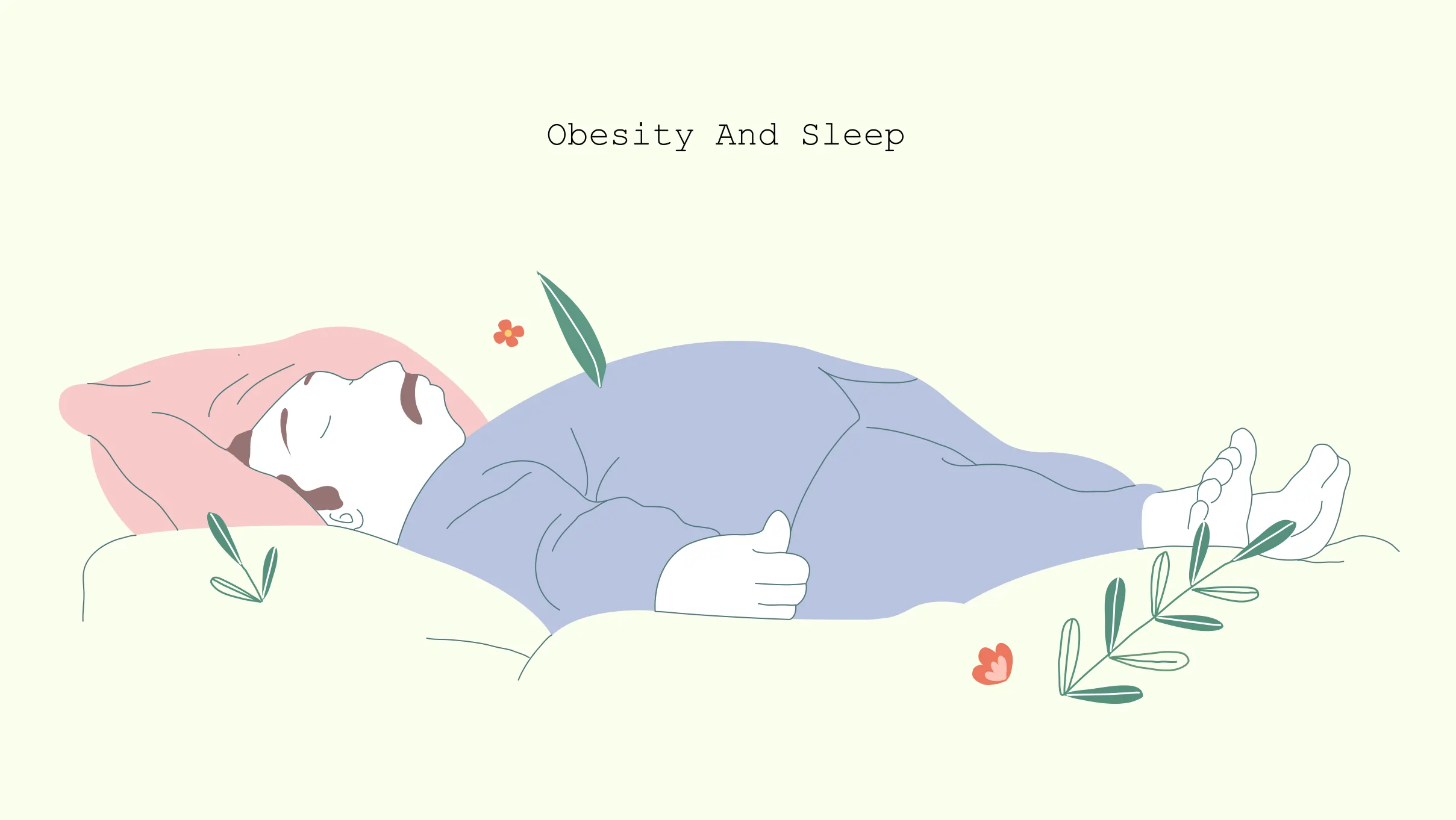Sleep and Obesity
Written by


Sleep is an important modulator of the overall functioning of the body. Thus a good night’s sleep is key to good health. Sleep is also the key to maintaining healthy body weight.
Obesity is a disease with multifactorial causes. And obesity has been paralleled in modern society by a trend of reduced sleep duration. Sleep loss is shown to increase the risk of obesity, where sleep restriction leads to hormonal alterations, which may favour an increase in calorie intake and a decreased energy expenditure, ultimately leading to weight gain.
But that’s not all; obesity and sleep disruption can also affect health. Keep reading to know more about obesity and sleep and the health effects of sleep loss.
Sleep and Childhood Obesity
Poor sleep is increasingly common in children, and the association between poor sleep or sleep loss in children and obesity is constantly found. In fact, besides factors like physical activity, dietary habits, and genetic inheritance, studies conducted in various parts of the world indicate that sleep is a significant determinant of body composition.
Children need a night of proper sleep to develop their bodies and minds better. And according to studies, lack of adequate sleep influences children to become overweight and obese. And besides affecting physical well-being, sleep impacts the emotional well-being of adolescents by causing substantial biological and psychosocial changes.
But how does obesity affect sleep?
Researchers explain the link between insufficient sleep and obesity is likely mediated by multiple pathways. The study proposed poor sleep disrupts hormone levels that regulate appetite and food intake. For instance, Brondel and other researchers reported an increased caloric intake and hunger after 4 hours of night sleep in 12 normal-weight young adults.
Similarly, hormonal disruption also affects energy expenditure. The energy imbalance can cause sleepiness and fatigue and decrease exercise-related energy expenditure under real-life conditions, leading to weight gain.
Sleep and Adult Obesity
The obesity epidemic is fueled by economic growth, industrialisation, mechanised transport, urbanisation, and an increasingly sedentary lifestyle. It is also influenced by a nutritional transition to processed foods and high-calorie diets, with a reduced sleep duration trend witnessing the prevalence of obesity in its citizens.
One of the studies show that sleep loss causes disbalance in these bodily functions, including metabolic and endocrine alterations. It influences decreased glucose tolerance and alteration of appetite-regulating hormones.
The study explains that obesity and sleep are closely related. Where a hormone promoting hunger increases with sleep restriction, and a hormone contributing to satiety perception decreases, the hormonal imbalance can cause sleepiness and fatigue, reducing exercise-related energy expenditure. That’s how sleep deprivation and obesity are related in adults.
How Sleep Loss Leads to Weight Gain
Obesity is a preventable disease, affecting, along with overweight, over a third of the world’s population. And as mentioned before, obesity and sleep are closely related.
Sleep loss causes disbalance in bodily functions, including metabolic and endocrine alterations. It influences the decreased glucose tolerance and alteration of appetite-regulating hormones in adults and children. The hormonal disruption affects caloric intake and energy expenditure which can lead to weight gain.
What Sleep Concerns Are Common in People Who Are Overweight
There are several negative impacts of chronic sleep disturbances on health. Following are the health conditions found more often in individuals who are overweight or obese.
Obstructive Sleep Apnea (OSA)
Did you know obesity and obstructive sleep apnea are related? Studies show obstructive sleep apnea could directly affect appetite regulation and increase caloric intake. Sleep deprivation is a risk factor for obesity, sleep fragmentation, sleep loss, and daytime sleepiness, which are associated with obstructive sleep apnea. Thus, sleep apnea and obesity are interconnected.
Gastroesophageal Reflux Disease (GERD)
Gastroesophageal reflux disease and obesity are also related and are often associated with sleep disruption. Studies report that GERD symptoms increase in severity when people gain weight. For example, obese people tend to have severe oesophagal inflammations.
Depression
Obesity and depression are two disorders that significantly impact global health. The scientific analysis shows a significant association between the two. Obesity is a risk factor for depression, and people with depression are also likely to suffer from sleep issues.
Asthma
Obesity is known to be both a major risk factor and a disease modifier for asthma in children and adults. Also, asthma may increase the risk of developing obesity. Furthermore, obese asthma is a complex syndrome that includes changes in lung function, alterations in diet and nutrients, metabolic dysregulation, microbiome changes, and differences in epigenetic/genomic regulation.
Osteoarthritis
Osteoarthritis is when flexible tissue at the ends of bones wears down. And according to an assessment, obesity demonstrated a dose-dependent relationship with Osteoarthritis risk. There has also been debate regarding what measure of obesity best correlates with Osteoarthritis risk.
How Can You Get Better Sleep When Overweight
Sleep hygiene refers to healthy sleeping habits. Following are some tips on how to sleep better with obesity.
Exercise
Both sufficient sleep and adequate exercise are crucial in maintaining health. And evidence suggests that physical exercise is an effective intervention for those who do not experience sufficient sleep quantity or quality.
Find a Mattress That Works for You
It is vital to have a proper spine alignment when sleeping. And a suitable mattress balances the contact pressure between your body and the mattress while keeping the spine aligned in a neutral position. According to a study, body weight plays a major role in the kind of mattress you should sleep on.
Select Foods Carefully
There is a significant effect of food on sleep. Evidence shows that specific dietary patterns may affect daytime alertness and nighttime sleep. For example, milk products, fish, fruit, and vegetables show sleep-promoting effects. Thus, nutritionists recommend having a proper and balanced diet, increasing fruit and vegetable intake, choosing whole grains, and favouring vegetable oils.
Final Words
A good night’s sleep is key to maintaining good health and healthy body weight. Sleep is an important modulator of the body’s overall functioning, and sleep loss/ disruption causes disbalance in bodily functions. This can have several negative impacts on health. So, try incorporating the aforementioned tips when you feel too fat to sleep comfortably.
FAQs
Does obesity make you sleep more?
According to clinical studies, obesity without sleep apnea is also linked to a higher prevalence of hype somnolence. In humans and animals, a high-fat diet is linked to excessive sleepiness.
Can obesity be caused by sleep deficiency?
One of the cornerstones to excellent health is getting a good night’s sleep, which may also help you keep a healthy weight. There is growing proof that those who sleep too little are more likely to gain weight and become obese than those who get seven to eight hours a night.
Is obesity caused by a lack of sleep?
One of the keys to good health—and possibly a key to maintaining a healthy weight—is getting a decent night’s sleep. Research shows that individuals who sleep too little are more likely to gain weight and become obese than those who get seven to eight hours of sleep each night.
Which sleep disorder is most strongly associated with obesity?
Increased body weight and the risk of OSA have consistently been linked in a number of cross-sectional studies. 40% of obese people have significant sleep apnea, while 70% of OSA patients are fat.
people like this article
Written by








